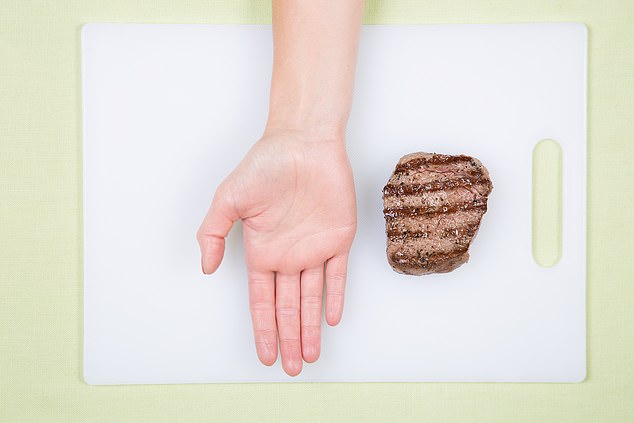It is sugar-free, unprocessed, and comes from an animal.
However, according to leading Harvard scientists, eating red meat may increase your risk of developing type 2 diabetes.
Eating 2.5 ounces of beef every day, the rough equivalent of a single In-N-Out burger, was associated with a 26 percent higher risk of being diagnosed.
The researchers behind the new paper told DailyMail.com that all other factors related to diet and lifestyle were taken into account (type 2 diabetes is commonly linked to diets high in sugar and low in fibre and junk food).
New research suggests that people who eat a diet rich in animal meat may be at higher risk of developing diabetes

That’s a serving of beef that’s about 100 grams, or 3.5 ounces, compared with the size of a hand. People in the study at higher risk for developing diabetes ate less beef than that daily — about 2.5 ounces.
The problem, according to a study of more than 200,000 adults over 36 years, is heme iron, a type of iron found in meat and dairy products.
They suggest that heme iron causes inflammation in the body, which makes the body less responsive to insulin, a hormone that controls blood sugar, and together, these two factors could increase the risk of developing type 2 diabetes.
These findings suggest that eating a plant-based diet could help protect against developing diabetes, study author Dr. Frank Hu, the Fredrick J. Stare Professor of Nutrition and Epidemiology at Harvard, told Dailymail.com.
“Reducing heme iron intake, particularly from red meat, and adopting a more plant-based diet may be effective strategies to reduce diabetes risk,” said Dr. Hu.
This is crucial considering how common type 2 diabetes is in the United States. 38 million adults in the U.S. had diabetes in 2021. According to the Centers for Disease Control and Prevention.
This represents approximately 14 percent of the population.
The disease causes problems with sugar processing and energy regulation. If left untreated, diabetes can cause serious problems, including nerve damage, heart disease and stroke.
Type 1 diabetes is often caused by an autoimmune disease. In contrast, type 2 diabetes is often caused by lifestyle choices, such as eating a high-sugar diet and not exercising.
Most people who want to avoid diabetes are advised to avoid sugar at all costs, but meat is not usually eliminated from the menu.
Animal flesh has increasingly been singled out as a contributor to a range of health problems, including cancer, despite the fact that it is rich in protein and nutrients such as vitamin B.
Dietitians are well aware of these concerns, Michelle Routhenstein, a dietitian specialising in preventative cardiology and founder of Entirely Nourished, who was not involved in the research, told DailyMail.com.
“We want to reduce red meat consumption,” she said, but added that it is essential that those who eat less animal meat consume enough protein and iron from other sources.
It can be found in leafy vegetables such as kale, as well as legumes and nuts.

Heme iron may increase inflammation and make the body less sensitive to insulin, the researchers said, and both factors may contribute to a higher risk of diabetes.
Research has also increasingly linked animal meat to diabetes.
In this study, which was published in the journal Nature’s metabolismThe Harvard researchers focused on a component of animal meat that they believed might be causing this link: heme iron.
It is a type of iron that comes from hemoglobin, the chemical in the blood that helps the body move oxygen. Most animal products contain it, but at different levels.
Beef and lamb are especially rich in this nutrient.
In this case, the researchers divided the 204,600 participants into five groups based on their intake of iron from animals, plants and supplements.
They also controlled for factors such as race, body weight, exercise, sugar intake, fat intake, smoking, blood pressure, family history and more.
“Therefore, the results are unlikely to be influenced by other dietary choices,” study author Fenglei Wang, a research associate in the Department of Nutrition at the Harvard T.H. Chan School of Public Health, told DailyMail.com.
People who consumed the highest amount of heme iron, about 1 1/2 mg per day — roughly two 1/2 ounces of beef or three ounces of lamb — had a 26 percent higher risk of developing diabetes than those who consumed the lowest amount of heme iron.
A typical serving of beef is about three ounces, and a one-piece In-N-Out burger contains about two ounces of beef. Eating a Big Mac, which contains a little more than three ounces of beef, per day would exceed that limit.
The group at highest risk of developing diabetes consumed the equivalent of five Big Macs per week.
Given that previous studies had found a similar link, Mr Wang said his findings were “not very surprising”.
Researchers aren’t sure what might explain the link between heme iron and type 2 diabetes. But Wang said people who consume a lot of heme iron also show signs of insulin resistance and inflammation in their blood.
When the body becomes resistant to insulin, it stops processing blood sugar as efficiently, which can cause it to build up in the bloodstream and develop into diabetes.
Inflammation can also cause diabetes by putting stress on the pancreas or other digestive organs, making it difficult for the body to process sugar.
IF YOU HAVE A HEALTH STORY, WE’D LOVE TO HEAR IT. CONTACT US AT HEALTH@DAILYMAIL.COM


